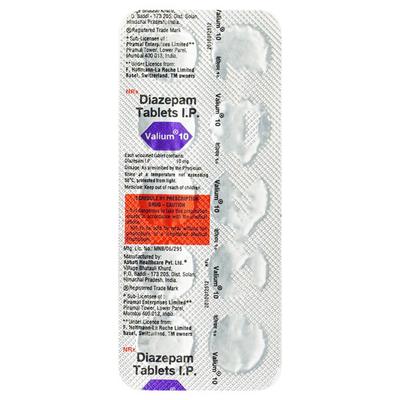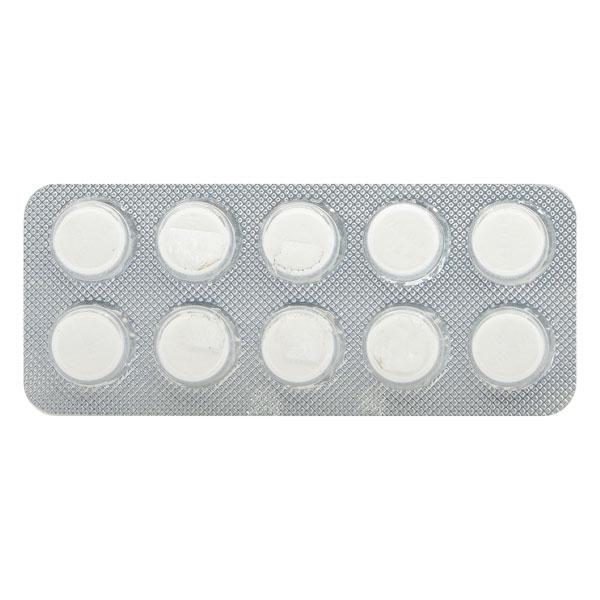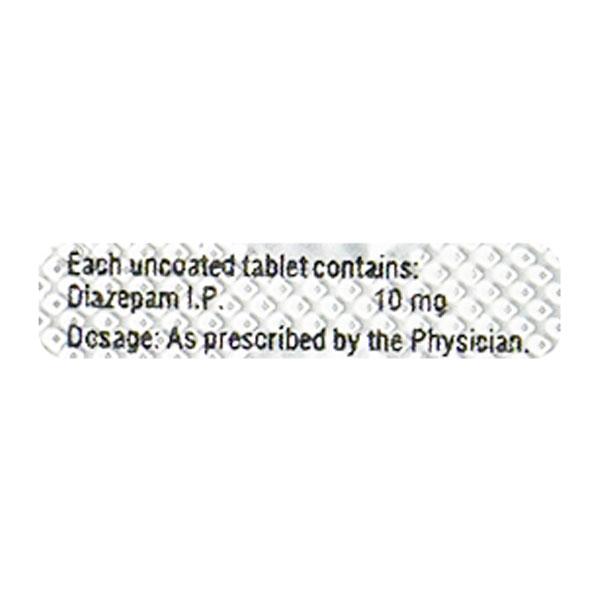

Netmeds First Membership
Quick Links
Introduction About VALIUM 10MG TABLET
VALIUM 10MG TABLET contains Diazepam which belongs to the group of medicines known as Benzodiazepines. VALIUM 10MG TABLET is used in adults for short term relief (2-4 weeks only) of severe anxiety, to relax muscles and for muscle spasm and cerebral palsy, manages epilepsy (when taken with other medicines), symptoms of alcohol withdrawal and helps to relax nervous dental patients.
In children VALIUM 10MG TABLET is used to manage tension and irritability caused by cerebral spasticity and helps to manage muscle spasm caused by tetanus (when taken with other medicines). VALIUM 10MG TABLET is also used in both adults and children before an operation to help with relaxation and to cause sleepiness.
Anxiety is an emotional state where you may sweat, tremble, feel anxious and have a fast heartbeat and may occur alone or with insomnia (trouble sleeping) or mental health problems. Cerebral palsy is a condition affecting the brain which causes movement problems and rigidity or stiffness. Cerebral spasticity is a condition associated with a disease or trauma affecting the brain or spinal cord which causes weakness, un-coordinated movements, rigidity, and stiffness.
Avoid alcohol, grapefruit juice, caffeinated drinks while taking VALIUM 10MG TABLET as it may lead to unwanted effects.
VALIUM 10MG TABLET is not recommended for use in patients suffering from severe breathing problems, phobia, depression, or hyperactivity, myasthenia gravis (muscle weakness), severe liver disease, porphyria and acute narrow angle glaucoma. Consult your doctor before taking.
VALIUM 10MG TABLET should be used with caution in patients suffering from alcoholism and recreational drug abuse, severe kidney failure, heart disease, personality disorder, epilepsy, suicidal behaviour or thoughts and arteriosclerosis. Consult your doctor before taking.
VALIUM 10MG TABLET should not be used during pregnancy except if absolutely necessary. Consult your doctor before taking. VALIUM 10MG TABLET is not recommended for use in breast feeding women as it may pass through the breast milk. Consult your doctor before taking.
VALIUM 10MG TABLET is not recommended for use in children below 6 months of age as its safety and effectiveness is not established. VALIUM 10MG TABLET should be used with caution in elderly patients as it may cause confusion and have effects on muscles causing falls and injuries. Consult your doctor before taking the medicine.
The most common side effects of taking VALIUM 10MG TABLET are drowsiness, confusion, ataxia (uncoordinated muscle movements and other movement disorders, tremor), fatigue, withdrawal symptoms. Consult your doctor in case any of above side effects worsens.
Uses Of VALIUM 10MG TABLET
It is used to manage the following conditions such as:
- short term relief of severe anxiety
- to relax muscles, muscle spasm and cerebral palsy
- epilepsy (when taken with other medicines)
- symptoms of alcohol withdrawal
- to relax nervous dental patients
- tension and irritability caused by cerebral spasticity and muscle spasm caused by tetanus (in children)
How VALIUM 10MG TABLET Works
VALIUM 10MG TABLET belongs to benzodiazepines which works by binding to specific receptors in brain and enhancing the activity of an inhibitory neurotransmitter (a chemical in brain) called GABA which is involved in sleep induction, memory, anxiety, epilepsy, and neuronal excitability.
How to use VALIUM 10MG TABLET
Take VALIUM 10MG TABLET as advised by your physician. Swallow VALIUM 10MG TABLET with a glass of water. Do not crush or chew the medicine. Your doctor will decide the exact dose and duration of management for you depending upon your age, body weight and disease condition.
Side Effects Of VALIUM 10MG TABLET
Common
- drowsiness, fatigue
- confusion
- ataxia (uncoordinated muscle movements) and other movement disorders, tremors
Uncommon
- muscles weakness
- memory loss
- difficulty in concentration
- headache
- dizziness
- nausea, vomiting
- constipation, diarrhoea
- itching, rashes, swelling, and skin redness
- increased salivation
- slurred speech
Rare
- behavioural changes (most seen in children and elderly patients) such as excitation, agitation, restlessness, irritability, aggressiveness, memory loss, inappropriate behaviour, delusion, rages, psychoses, nightmares, or hallucinations
- emotional withdrawal
- low blood pressure, fainting
- dry mouth
- gynecomastia (breast enlargement in males)
- impotence, changes in sexual drive
- increase in appetite
- loss of bladder control, lack of ability to urinate
- increased mucus secretion in lungs
- changes in liver enzymes
- slow heartbeat, heart failure and cessation of heartbeat (cardiac arrest)
- blood disorders which may lead to infections, nose bleeds, sore throat
Stop taking VALIUM 10MG TABLET and consult your doctor immediately in case you experience:
- breathing problems such as very slow or shallow breathing
- rashes, swelling of your lips, tongue and throat or body causing sudden wheezing, difficulties to swallow, or fainting
- cessation of breathing
- jaundice (yellowish discolouration of the skin and whites of eye)
- restlessness, agitation, irritability, aggressiveness, anxiety, delusion, anger, nightmares, hallucinations, psychoses, inappropriate behaviour
- self-harming thoughts
- new or worse anxiety, irritability
- trouble sleeping (insomnia)
- acting on dangerous impulses
- feeling agitated or restless
- an extreme increased activity and talking (mania)
- new or worse depression
- panic attacks
- acting aggressive, being angry, or violent and other unusual changes in behaviour or mood
How To Manage Side Effects
Nausea or Vomiting:
Take the medicine, with or just after a meal. Stick to simple meals. Avoid eating oily or spicy food. However, contact your doctor if nausea and vomiting worsen.
Itchy skin:
Avoid taking hot showers because hot water can irritate your skin and do not scratch the affected area. Use sunscreen and protective clothing when going outdoors or use unscented moisturizers to soothe and hydrate the skin and contact your doctor if itching persists.
Diarrhoea:
Drink plenty of water or fruit juices to keep yourself hydrated. Do not take any medicine on your own for managing diarrhoea and contact your doctor if diarrhoea worsen.
Constipation:
Eat plenty of fibre rich foods such as fresh fruits, vegetables, and cereals. Drink water and exercise regularly however, contact your doctor if constipation persists.
Headache:
Rest and relax. Drink plenty of water and electrolytes. Apply a pain-relieving balm on the head in case required. Do not consume alcohol and contact your doctor if your headache did not improve.
Dizziness:
Try to rest and relax. Get enough sleep. Avoid driving or operating machinery in case you feel drowsiness or dizziness. Avoid alcohol consumption as it aggravates dizziness and contact your doctor if dizziness worsen.
Warning & Precautions
Pregnancy
VALIUM 10MG TABLET should not be used during pregnancy except if absolutely necessary. Consult your doctor before taking.
Breastfeeding
VALIUM 10MG TABLET is not recommended for use in breast feeding women as it may pass through breast milk. Consult your doctor before taking.
Driving and Using Machines
VALIUM 10MG TABLET causes sleepiness, forgetfulness, poor coordination, dizziness which can affect your driving ability. Do not drive or operate machines after taking VALIUM 10MG TABLET.
Alcohol
Do not consume alcohol while taking VALIUM 10MG TABLET as it increases the sedative effect of VALIUM 10MG TABLET and lead to fall injuries and makes you very sleepy.
Kidney
VALIUM 10MG TABLET should be used with caution in patients suffering from severe kidney failure. Consult your doctor before taking.
Liver
VALIUM 10MG TABLET is not recommended for use in patients suffering from severe liver disease. Consult your doctor before taking.
Allergy
Do not take VALIUM 10MG TABLET if you are allergic to Diazepam, or other benzodiazepines or to lactose, or to any other ingredients of this medicine.
Lungs
VALIUM 10MG TABLET is not recommended for use in patients with severe breathing problems (including slow and/or shallow breathing). Consult your doctor before taking.
Heart Disease
VALIUM 10MG TABLET should be used with caution in patients with heart disease. Consult your doctor before taking.
Others
VALIUM 10MG TABLET is not recommended for use if you suffer from:
- phobia (a fear of a particular object or situation) or other mental illness
- depression accompanied with or without anxiety or hyperactivity
- myasthenia gravis (severe muscle weakness)
- sleep apnoea (abnormal pauses in breathing during sleep)
- porphyria (rare blood disorder)
- acute narrow angle glaucoma (condition in which fluid pressure in eye increases leading to damage of optic nerve)
Before taking VALIUM 10MG TABLET inform your doctor if you have:
- personality disorders
- epilepsy
- smoking habit
- self-harming thoughts
- arteriosclerosis (poor blood supply to brain)
- hypoalbuminemia (low levels of blood protein called albumin)
- depression
- rare hereditary problems of galactose intolerance
Use in pediatrics:
VALIUM 10MG TABLET is not recommended for use in children below 6 months of age as its safety and effectiveness is not yet established. Consult your doctor before taking.
Use in geriatrics:
VALIUM 10MG TABLET should be used with caution in elderly patients as it causes confusion and have effects on muscles causing falls and injuries. Consult your doctor before taking.
Interactions
A. Drug-Drug interactions:
Before taking VALIUM 10MG TABLET, inform your doctor if you are taking any of the following medicine:
- sodium oxybate, modafinil (used for management of narcolepsy)
- fluvoxamine, fluoxetine, isocarboxazid, amitriptyline (medicines used for management of depression)
- clozapine, olanzapine, fluphenazine, zuclopenthixol, haloperidol, methotrimeprazine (medicine used for management of mental disorders)
- cetirizine, chlorpheniramine (medicine used for management of allergies)
- halothane, isoflurane (medicines used during surgeries)
- alprazolam, chlordiazepoxide (medicine used for management of anxiety)
- zolpidem, zopiclone (medicine used for management of sleep disorders)
- erythromycin, clarithromycin (medicines used for management of bacterial infections)
- suxamethonium, tubocurarine (medicine used for muscle relaxation)
- morphine, methadone, and buprenorphine (medicine used as strong painkillers)
- phenobarbital (medicine used for management of epilepsy and mental disorders)
- furosemide, chlorothiazide, diltiazem, verapamil (medicines used for management of high blood pressure)
- isosorbide mononitrate (medicines used in heart patients)
- magnesium carbonate, magnesium hydroxide (medicines used for management of acidity)
- disulfiram (medicine used to manage alcohol addiction)
- phenytoin, carbamazepine, sodium valproate (medicines used in management of epilepsy)
- theophylline (medicine used to manage asthma and other breathing disorders)
- cimetidine, omeprazole, or esomeprazole (medicines used for management of acidity)
- rifampicin, isoniazid (medicine used for management of tuberculosis)
- St John’s wort (herbal medicine used for management of mental illness)
- amprenavir, atazanavir, ritonavir, delavirdine, efavirenz, indinavir, nelfinavir, zidovudine or saquinavir (medicines used for management of viral infections)
- fluconazole, itraconazole, ketoconazole or voriconazole (medicines used for management of fungal infections)
- oral contraceptives (medicines used to manage pregnancy)
- cisapride (medicine used for management of stomach problems)
- betamethasone, dexamethasone (medicines used to manage inflammation)
- levodopa (medicine used to manage Parkinson’s disease)
- ketamine (medicine used during surgeries)
- nabilone (medicine used to manage nausea and vomiting)
- doxazosin and beta blockers such as propranolol, metoprolol (medicine used to manage high blood pressure) and moxonidine (medicine used to manage mild to moderate high blood pressure)
- valproic acid (medicine used to manage fits and mental disorders)
- idelalisib (used to manage cancer)
B. Drug-food interaction:
Avoid consuming grapefruit juice as it may increase VALIUM 10MG TABLET levels in blood. Do not consuming caffeinated drinks while taking VALIUM 10MG TABLET as it may reduce the effect of VALIUM 10MG TABLET.
Overdosage:
In case you or anybody else accidentally takes too much of VALIUM 10MG TABLET consult the doctor immediately or visit the nearby hospital. Symptoms of overdosage are clumsiness, loss of coordination, speech problems, irregular or slow heartbeat, uncontrolled eye movement, muscle weakness, excitement, sleepiness, deep sleep.
Synopsis
| Drug | : | Diazepam |
| Pharmacological Category | : | Benzodiazepines |
| Therapeutic Indication | : | Severe anxiety, Muscle spasm, Cerebral palsy, Epilepsy, Symptoms of alcohol withdrawal, Tension and Irritability |
| Dosage Forms | : | Tablet, Capsule, Syrup, Suspension, Solution, Suppositories, Injection |
More Information
- Keep VALIUM 10MG TABLET out of reach of children
- Store VALIUM 10MG TABLET below 25°C
FAQs About VALIUM 10MG TABLET
What are uses of VALIUM 10MG TABLET?
VALIUM 10MG TABLET is used in adults for short term relief (2-4 weeks only) of severe anxiety, to relax muscles and for muscle spasm and cerebral palsy, manages epilepsy (when taken with other medicines), symptoms of alcohol withdrawal and helps to relax nervous dental patients.
What happens if I stop taking VALIUM 10MG TABLET?
Do not stop taking VALIUM 10MG TABLET suddenly, if you stop taking VALIUM 10MG TABLET suddenly you may experience withdrawal symptoms such as excitement or depression, nervousness, sleeping difficulties, sweating, irritability, diarrhoea, upset stomach, reoccurrence and worsening of symptoms.
What should I avoid consuming while taking VALIUM 10MG TABLET?
You should avoid consuming grapefruit juice as may increase VALIUM 10MG TABLET levels in blood. Avoid consuming caffeinated drinks while taking VALIUM 10MG TABLET as it may reduce the effect of VALIUM 10MG TABLET. Do not consume alcohol while taking VALIUM 10MG TABLET as it increases the sedative effect of VALIUM 10MG TABLET and make you very sleepy.
How VALIUM 10MG TABLET works?
VALIUM 10MG TABLET belongs benzodiazepines which works by binding to specific receptors in brain and enhancing the activity of an inhibitory neurotransmitter (a chemical in brain) called GABA which is involved in sleep induction, memory, anxiety, epilepsy and neuronal excitability.
What happens if somebody take too much VALIUM 10MG TABLET?
Symptoms of overdosage are clumsiness, loss of coordination, speech problems, irregular or slow heartbeat, uncontrolled eye movement, muscle weakness, excitement, sleepiness, deep sleep.
Is VALIUM 10MG TABLET safe in pregnancy?
VALIUM 10MG TABLET should not be used during pregnancy except if absolutely necessary. Consult your doctor before taking.
What are the side effects of taking VALIUM 10MG TABLET?
The most common side effects of taking VALIUM 10MG TABLET are drowsiness, fatigue, confusion, ataxia (uncoordinated muscle movements and other movement disorders, tremor. Consult your physician if any of the side effects worsen.
References
1. KD Tripathi. Drugs Acting on Central Nervous System. Essentials of Medical Pharmacology. 7th edition. 2013. Page- 418.
2. Jaberpreet S. Dhaliwal, Alan Rosani, Abdolreza Saadabadi. Diazepam. National Centre for Biotechnology. NLM. National Institute of Health. Statpearls. May 2022. [Accessed on 10th September 2022] https://www.ncbi.nlm.nih.gov/books/NBK537022/#article-20488.s6
3. Accord. Electronic Medicines Compendium. [Revised in August 2020] [Accessed on 10th September 2022] https://www.medicines.org.uk/emc/files/pil.4524.pdf
4. Accord. Electronic Medicines Compendium. [Revised in September 2019] [Accessed on 10th September 2022] https://www.medicines.org.uk/emc/product/4523/pil#gref
5. Actavis Group PTC. Health Products Regulatory Authority. [Revised in April 2020] [Accessed on 10th September 2022] https://www.hpra.ie/img/uploaded/swedocuments/726165da-ecf3-4454-9c57-e1589c8cba49.pdf
6. Roche. Food and Drug Administration. [Revised in March 2016] [Accessed on 10th September 2022] https://www.accessdata.fda.gov/drugsatfda_docs/label/2016/013263s094lbl.pdf
7. AA Pharma Inc. Diazepam. [Revised in January 2019] [Accessed on 10th September 2022] https://www.aapharma.ca/downloads/en/PIL/2019/Diazepam-Pr_Mono-ENG-Jan_7_2019.pdf










